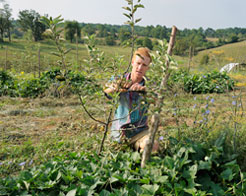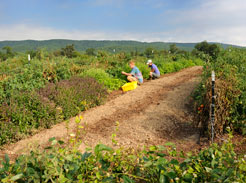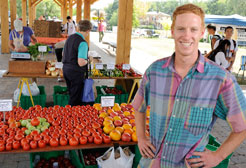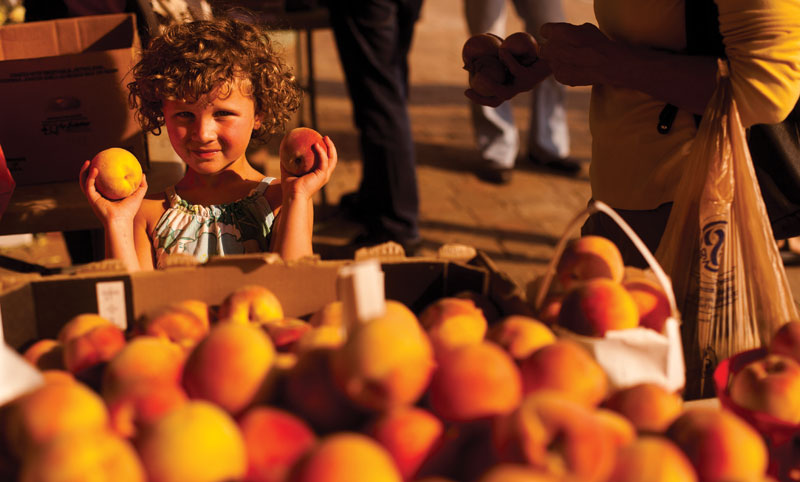 |
|
||||||
|
|
||||||||||||||||||||||||||||||||||||||||||||||||||||||||||||||||||||||||||||||||||||||||||||||||||||||||||||||||
|
Comfort Food
by DENISE YOUNG
Pall refers to it as "intercropping," and while the term might sound 21st century, the idea is hardly new. Crops like buckwheat, a cover crop that improves soil health, border rows of summer squash, peppers, and tomatoes. Chickens in portable cages that Pall refers to as "chicken tractors" feast in the grassy areas between plots of various crops. Glade Road Growing is a vision: a small farm in a small town, a sign of a growing demand for locally produced food. The sight isn't one of endless waves of grain, but rather an ecosystem of interconnected crops thriving in harmony. Fragrant flowers provide nectar, sustaining the predatory insects that will prey on "bad insects," those that attack the vegetable plants. During a farm tour, Pall, who runs the farm with his wife, Sally Walker (biological systems engineering '07, M.S. '09), details the reasoning behind the setup of an already bountiful first-year farm. "We believe in diversifying," Pall says. "It's all one system, not just one-dimensional." Using intercropping, Pall expects his yield, per square foot, to be three times what a large-scale farm can achieve. "The more land you manage, [the more you] cut down your quality." He sells his produce at the Blacksburg Farmers Market and hopes someday to branch into home delivery using a pickup truck that's been converted to electric. Happy meals: Local foods are more than mere sustenance "The real interest spiked a couple years ago with the tomato and peanut-butter crises. People began wondering, "Where is my food coming from? What am I eating?' And one way to know that is to seek out local growers ... [to] buy directly from the producer, establish a relationship, and see the production process," said Sheri Dorn, a Virginia Cooperative Extension agent in Roanoke, Va. The answer is simple, natural, and local—at least to hear Joel Salatin, of family-owned and Farmers markets and Community Supported Agriculture (CSA) systems are the primary venues for purchasing local products, though natural and health foods stores or co-ops often stock locally produced goods. CSAs allow consumers to buy "shares" to a farm; in return, they receive a box or basket of produce each week. Such programs don't just feed consumers. Eating local also stimulates a vibrant economy by retaining local dollars. "If each household in Virginia devoted $10 of their weekly budget to Virginia farm products, it would have a direct economic impact of $1.65 billion [per year]," noted Eric Bendfeldt, a community viability specialist with Virginia Cooperative Extension. Bendfeldt added that it's not simply local food that's important. He encouraged consumers to buy food produced in the region instead of processed food, which travels an average of 1,500 miles. "A local food system is about four times as energy-efficient as a global system, but a regional food system is 17 times more energy-efficient than a global food system," said Bendfeldt, citing research by Iowa State University and the Leopold Center for Sustainable Agriculture. "Therefore, it is important to find a balance and know the context for local, regional, national, and global markets." Having an abundance of fresh food readily accessible can mean good things for nutrition and the battle against obesity. Carmen Byker (Ph.D. human nutrition, foods, and exercise '11) noted that simply having access to fresh produce fosters better nutrition. "Many times, farmers markets provide a greater proportion of fresh foods than processed foods. The customer is likely to find an abundance of fresh fruits and vegetables, meats, and dairy products. Baked goods are available too, but highly processed foods laden with chemicals are less likely to be available." During her time at Tech, Byker served on the Blacksburg Farmers Market board of directors and started a program that provided fresh produce to the families of Head Start children. On a sunny afternoon at the Blacksburg market, a thriving microcosm of the new shape of food production, distribution, and consumption presents itself. Customers talk face-to-face with the people who grow their food. Vibrant rows of newly harvested zucchini and summer squash, containers of freshly picked peaches and blueberries, and made-from-scratch pastries await market-goers. Behind each booth stands a food producer, ready to answer questions about farming methods, pesticide use, or freshness of produce. Vendors eagerly offer tips on anything from the best way to store or prepare produce to starting your own garden.
"We're bringing it back to the basics," said Ellen Stewart, director for the Blacksburg Farmers Market, of the experience. "[People are] able to build a relationship of trust with the person producing [their] food." The social atmosphere, the contributions to the local economy, and the accountability aren't the only perks to eating local. There's also what one might call the "fresh factor." "We take pride in going to pick the fruit the night before the farmers market," said Ron Holdren, a vendor at the Blacksburg market. "You're not going to go to Kroger and find a peach that was picked the night before." Many local farmers open their fields to consumers. More than growers, they are educators and entrepreneurs, continually studying and improving their methods. One might even call them trendsetters. The 21st-century 'Victory Garden': Urban gardening gains ground People are moving closer to their food sources as they try their own hand at growing. "Your backyard is a resource you can tap," said Salatin, listing rain barrels, composting, companion planting, raised beds, and even chickens as ideas for utilizing a backyard. More than a hobby, urban gardening can nurture a sense of social justice and equity. By providing people in economically depressed areas with gardening space, urban gardens provide access to healthier food options. In some cities, vacant lots are being turned into community gardens. The effect isn't just on nutrition, said Wendy Jacobson, an associate professor in the College of Architecture and Urban Studies who teaches courses that address a range of urban and community design topics. "When people get together to accomplish something like this, it's a tremendous community-building experience, especially for lower-income areas where people, over time, can begin to feel isolated." And the mere act of planting a seed and watching it grow can have a therapeutic effect. "Planting a garden, in and of itself, is an act of faith and optimism. It's an active rather than a passive interaction with nature."
"It's very easy to get overwhelmed," cautioned Dorn. "Gardens are a lot of work. You put a lot of time and energy into it, especially when you're first starting out." For those thinking of starting a garden, fall, not spring, can be a great time to start your plan, according to Dorn. "Start with a soil test," she said. "November is a great time to test your soil because soil-testing facilities don't have as much demand." If you find you need to adjust the soil's pH level, applying lime or sulfur in the fall will give you six months for the changes to occur. In December, January, and February, seed catalogs come out, and it's time to make a garden plan. Do your homework: Find out which plants grow well in the region, plan crop rotation, and look for cultivars that will provide insect and disease resistance. Then in the spring, you'll be starting out on the right foot. Growers considering container gardening should buy patio or bush varieties of plants. Tomatoes, peppers, cucumbers, and squash can be grown in containers, along with greens like lettuce, spinach, kale, and many herbs, such as basil. Hanging baskets are also an option. Most of all, don't be afraid of failure. "If there's one thing I always say, it's that if it's worth doing, it's worth doing poorly the first time," said Salatin. "At the end of the day, it's a skill that's worth learning. Don't expect a bumper crop the first time." • DON'T OVER- or UNDER-FERTILIZE. Over time, gardeners learn to tell when a plant has sufficient fertilizer, said Joyce Latimer, professor of horticulture. "Gardeners know when a plant is happy. There's this green vibrancy. When a plant is not fertilized enough, it starts to look unhappy, with yellowing or lower-leaf death." "It's not as complicated as people make it," Latimer said. "Always follow the guidelines. More is not better. In many cases, more is harmful." You can also buy controlled-release fertilizers so you don't have to remember to do it once a month. State Master Gardener Coordinator Dave Close cautioned against adding nitrogen-based fertilizer when a plant is close to producing fruit or ready to harvest. Adding fertilizer promotes root and leaf growth, and at this stage, the focus should be on fruit production. For backyard gardens, too, excess fertilizer can lead to runoff of phosphorous and nitrogen, polluting waterways. Experts also urge novice gardeners to keep in mind that their plants will likely be easily accessible to pets and children. Generally, limit contact with treated plants until the application has dried. Read the product labels for specific warnings. Close also had some advice about pesticides. "The less pesticide you have to use, whether organic or conventional, the better it is, from a financial or environmental standpoint. It means that things are healthy on their own without additional help. You should just use [these products] as a last resort." • WATER FREQUENTLY. Dorn offered a rule of thumb for determining if a plant needs to be watered. "One method of determining if your plants have enough water is to lift the pot, to know what it feels like when it's fully watered. If it's light the next time you lift it, you know you need to water it. If you can't lift [the container], stick your fingers down in the soil, but that's only a reasonable guess because the surface will dry more quickly and the roots are deeper." Plants should be watered before they reach the wilting point. "If you don't keep plants evenly watered, you can run into nutrition and plant health issues." If gardeners want to ensure a bountiful harvest, watering plants consistently is the best bet.
Perhaps it's not a new face, after all, but a throwback to a more holistic approach to the environment—working with the land, rather than against it. "Nonlocal sourcing is the tip of a huge severance that has broken down the connection between us and our umbilical," said Salatin. Never before have so many people lacked a deep understanding of the way their food is grown and produced, he lamented. Pall puts it more directly. "Food is important," he said. "Food is your medicine." |
|
|||||||||||||||||||||||||||||||||||||||||||||||||||||||||||||||||||||||||||||||||||||||||||||||||||||||||||||||
|
||||||||||||||||||||||||||||||||||||||||||||||||||||||||||||||||||||||||||||||||||||||||||||||||||||||||||||||||
| Blacksburg Farmers Market | ||||||||||||||||||||||||||||||||||||||||||||||||||||||||||||||||||||||||||||||||||||||||||||||||||||||||||||||||






